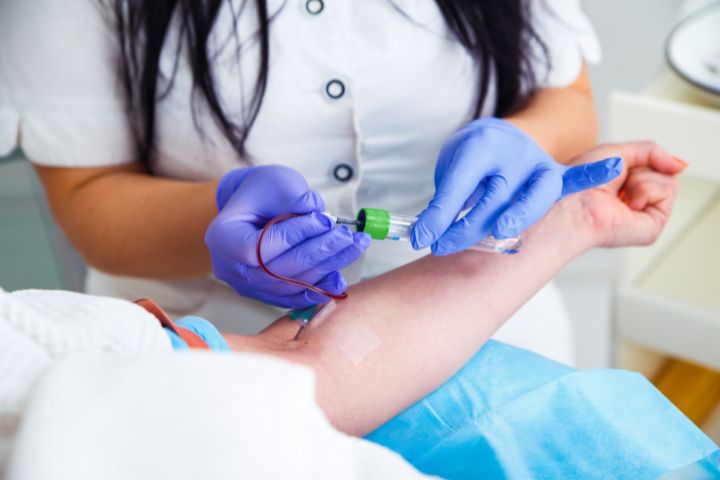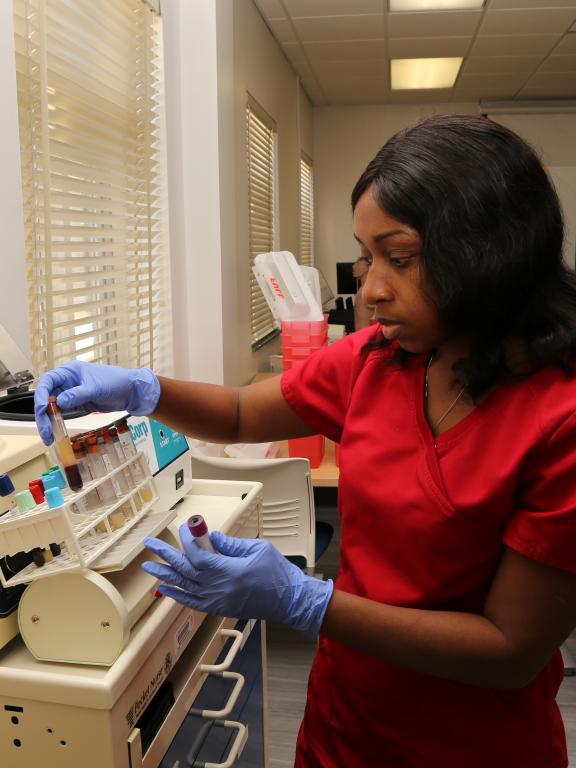Phlebotomy Classes Near Me: Your Complete Guide to Enrollment
Wiki Article
The Path to Accreditation: Recognizing the Phlebotomy Training Course Trip and Its Relevance
As you take into consideration the course to certification in phlebotomy, it's important to understand the role you'll play in healthcare. Your training will cover important skills, from blood collection techniques to patient interaction.
The Function of Phlebotomists in Healthcare
Phlebotomists play an important role in the medical care system, working as the crucial link in between people and necessary diagnostic testing. You'll execute blood attracts, guaranteeing samples are accumulated precisely and safely. Your proficiency aids in identifying medical problems, checking health and wellness, and guiding therapy decisions.In your daily communications, you'll need to develop depend on with clients, making them really feel comfy during what could be a difficult experience. You're responsible for classifying and dealing with examples meticulously to avoid contamination or errors, which might affect examination outcomes.
Yet, you'll frequently function alongside physicians and nurses, interacting critical info about clients' problems. Your role is essential in keeping the workflow in health care setups, guaranteeing prompt and exact results. By grasping your abilities, you contribute meaningfully to individual treatment, making you a vital part of the clinical group. Welcoming this responsibility is vital to your success as a phlebotomist.
Overview of Phlebotomy Training Programs
When exploring phlebotomy training programs, you'll find different types made to fit various routines and finding out designs. Each program helps you develop important skills like blood collection and client interaction. Comprehending these choices is essential to selecting the best path for your profession.Kinds Of Training Programs
Several kinds of training programs are offered for those looking to come to be efficient in phlebotomy. Additionally, some health centers and centers offer on-the-job training programs, supplying practical experience while you find out. Whatever path you select, each program aims to furnish you with the necessary skills for an effective phlebotomy profession.
Trick Skills Developed
Grasping phlebotomy calls for a set of essential abilities that are created through complete training programs. You'll find out technical skills like appropriate blood vessel option, needle insertion, and blood collection techniques. These hands-on methods ensure you can execute treatments safely and efficiently. Furthermore, interaction abilities are basic; you'll require to interact with patients, discuss treatments, and placed them at convenience. Recognizing anatomy and physiology is vital, as well, as it aids you situate blood vessels and understand the body's response to blood draws. Lastly, you'll acquire understanding of safety and security methods and infection control, ensuring you keep a clean and sterile setting. Each of these abilities is important for your success as a certified phlebotomist, making you an important asset in any type of healthcare setting.Trick Parts of a Phlebotomy Course
In a phlebotomy course, you'll concentrate on crucial subjects that prepared for your future career. You'll participate in hands-on training that permits you to apply what you've found out in real-world setups. Both the core curriculum and practical experience are important for your success as a phlebotomist.Core Curriculum Summary
While pursuing a phlebotomy training program, you'll experience a core educational program developed to outfit you with essential abilities and knowledge. Phlebotomy Training Course. This educational program usually consists of anatomy and physiology, concentrating on the circulatory system and comprehending blood parts. You'll also find out around different kinds of blood collection methods, including venipuncture and capillary slit techniquesAdditionally, infection control and safety protocols are vital elements, ensuring you understand exactly how to preserve a sterilized atmosphere. You'll examine patient interaction, highlighting communication and empathy, which are crucial for relieving client stress and anxiety.
Hands-On Training Experience
Getting hands-on experience is a crucial component of your phlebotomy training program. This functional training enables you to apply what you've learned in a real-world setting, boosting your abilities and self-confidence. You'll practice venipuncture techniques, learn just how to take care of various kinds of specimens, and obtain accustomed to the devices utilized in the field. Under the advice of seasoned trainers, you'll refine your abilities, guaranteeing you're prepared for any scenario you could deal with.Furthermore, you'll get the opportunity to engage with patients, which is important for developing your interaction skills. This mix of technical effectiveness and interpersonal abilities is essential for your success as a licensed phlebotomist. Ultimately, hands-on training is where theory meets technique, solidifying your expertise and readiness for qualification.
Accreditation and Licensing Requirements
Prior to you can start your job in phlebotomy, it is important to recognize the certification and licensing needs that vary by state. Most states need phlebotomists to hold a certification from an acknowledged company, such as the National Phlebotomy Association or the American Culture for Clinical Pathology. These qualifications generally entail passing a test that evaluates your understanding and abilities in the field.Along with qualification, some states have specific licensing demands. You might require to complete a specific variety of hours in professional practice, submit proof of training, or undertake a history check. It is very important to research your state's guidelines to ensure you meet all required standards.
Remaining informed about these demands not only aids you safeguard a setting yet also boosts your reputation as a professional. By fulfilling these needs, you'll be well on your means to a successful career in phlebotomy.
Hands-On Training and Practical Experience
Hands-on training and useful experience are necessary elements of your phlebotomy education and learning, as they enable you to use academic understanding in real-world circumstances. During your training, you'll engage in supervised venipuncture, learn proper techniques, and become accustomed to numerous blood collection tools. This straight participation is important for developing your confidence and developing your skills.You'll function very closely with knowledgeable experts who can direct you through the subtleties of individual interaction and sample handling. Each session not just strengthens your understanding however also prepares you for the busy setting of health care settings.
In addition, several programs integrate professional rotations, permitting you to experience diverse settings, from hospitals to outpatient facilities. This direct exposure helps you adjust to various challenges and person requirements, ensuring you're well-prepared for your future duty. Accept these opportunities, as they're necessary to coming to be a proficient and compassionate phlebotomist.
Obstacles Dealt With Throughout Training
While acquiring hands-on experience is essential, it's crucial to recognize the difficulties that can occur throughout your phlebotomy training. Furthermore, mastering the skills needed for blood draws takes practice; you may have a hard time with method originally.Time monitoring can also be an obstacle, as balancing concept, functional sessions, and individual dedications can really feel challenging. You might deal with differing learning speeds amongst your peers, causing sensations of insecurity if you think you're falling back. Ultimately, adjusting to the different individualities of teachers can be difficult, as each might have a special mentor style.
Recognizing these obstacles early can prepare you for success and help you establish strength throughout your training trip.
Profession Opportunities After Qualification

As you get experience, you could even take into consideration specializing in locations like pediatric or senior citizen phlebotomy, providing to details individual demands. Some phlebotomists choose to progress their careers by becoming research laboratory technicians or going after further education in medical care fields.
In addition, your accreditation can lead to functions in training or supervising brand-new phlebotomists, allowing you to share your understanding. With the medical care market continually expanding, your abilities will constantly remain in demand, leading the way for a secure and fulfilling job. Embrace the chances awaiting you!
Frequently Asked Inquiries
What Is the Typical Period of a Phlebotomy Educating Course?
Phlebotomy training programs generally last around 4 to 8 weeks. You'll take part in hands-on method, class guideline, and online understanding. Completing this training prepares you for qualification and a rewarding occupation in medical care.Are Online Phlebotomy Courses Available?
Yes, online phlebotomy programs are offered. They supply flexibility and comfort, permitting you to study at your own speed. Simply validate the program is recognized to satisfy certification requirements and acquire useful skills for your job.Exactly How Much Does Phlebotomy Training Typically Cost?
Phlebotomy training typically sets you back in between $700 and $2,500, relying on the program and area. You must take into consideration factors like course length, consisted of products, and hands-on experience when picking the right training for you.What Are Common Prerequisites for Phlebotomy Training?
Usual requirements for phlebotomy training typically include a senior high school diploma or GED, booster shots, and a background check. Some programs may additionally call for fundamental healthcare expertise or accreditations, ensuring you're prepared for hands-on training.Can I Function While Completing My Phlebotomy Training?
Yes, you can function while finishing your phlebotomy training. Numerous pupils equilibrium jobs with their researches, however ensure to handle your time successfully to guarantee you fulfill both work and training Phlebotomy Training Course dedications effectively.Report this wiki page